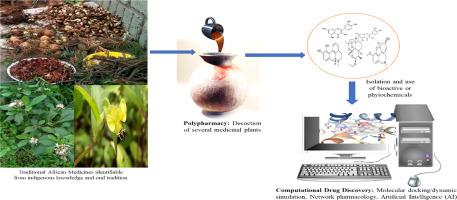非洲药用植物的历史和民族药理学观点:从传统疗法到计算药物发现
IF 3.3
Q2 MULTIDISCIPLINARY SCIENCES
引用次数: 0
摘要
几个世纪以来,非洲药用植物在传统医疗保健系统中发挥了重要作用。具体来说,它们是治疗各种疾病的主要药物。代代相传的民族药理学知识为了解非洲本土植物的生物活性特性提供了宝贵的见解。然而,将这些传统药物转变为经过科学验证的治疗方法的过程一直很缓慢。这可能是由于历史边缘化、文献不足和研究经费有限。计算机辅助药物设计(CADD)和计算药物发现的最新进展为验证和优化来自非洲药用植物的生物活性化合物开辟了新的领域。本文讨论了非洲民族医学的历史演变、对全球药理学的潜在贡献,以及计算技术(如分子对接、网络药理学和人工智能)在加速药物发现方面的新作用。通过将历史和民族药理学观点与现代计算策略相结合,本综述突出了非洲药用植物在治疗传染病、代谢紊乱和癌症方面显示出前景的范例研究。此外,它强调了应对诸如生物剽窃、知识产权以及传统治疗师和科学家之间合作框架的必要性等挑战的潜在解决方案。因此,这篇综述激发了非洲药用植物在制药应用方面的潜力,并倡导跨学科的方法来利用它们在现代的全部治疗潜力。本文章由计算机程序翻译,如有差异,请以英文原文为准。

Historical and ethnopharmacological perspectives on African medicinal plants: From traditional remedies to computational drug discovery
African medicinal plants have played a significant role in traditional healthcare systems for centuries. Specifically, they served as primary therapeutic agents for a wide range of ailments. Ethnopharmacological knowledge, passed down through generations, has provided invaluable insights into the bioactive properties of African indigenous flora. However, the transition of these traditional medicines into scientifically validated therapeutics has been slow. This could be due to historical marginalization, inadequate documentation, and limited research funding. Recent advancements in computer-aided drug design (CADD) and computational drug discovery have opened new frontiers for validating and optimizing bioactive compounds derived from African medicinal plants. This narrative review discussed the historical evolution of African ethnomedicine, its potential contributions to global pharmacology, and the emerging role of computational techniques, such as molecular docking, network pharmacology, and artificial intelligence (AI), in accelerating drug discovery. By integrating historical and ethnopharmacological perspectives with modern computational strategies, this review highlighted examplary studies where African medicinal plants have shown promise for treating infectious diseases, metabolic disorders, and cancer. Furthermore, it highlights potential solutions to challenges such as biopiracy, intellectual property rights, and the necessity of collaborative frameworks between traditional healers and scientists. Therefore, this review piqued the potential of African medicinal plants in pharmaceutical applications and advocates for interdisciplinary approaches to harnessing their full therapeutic potential in the modern era.
求助全文
通过发布文献求助,成功后即可免费获取论文全文。
去求助
来源期刊

Scientific African
Multidisciplinary-Multidisciplinary
CiteScore
5.60
自引率
3.40%
发文量
332
审稿时长
10 weeks
 求助内容:
求助内容: 应助结果提醒方式:
应助结果提醒方式:


